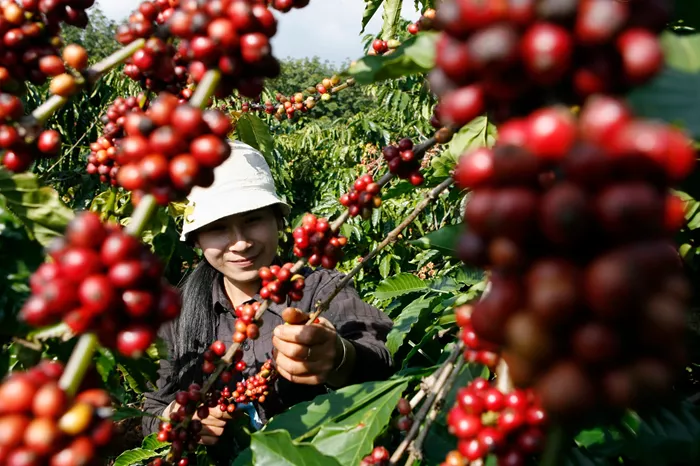Brazilian coffee fields, renowned for their vast stretches from the southern plains of Paraná to the expansive areas of São Paulo and Minas Gerais, are facing unprecedented challenges this year. Minas Gerais, larger than Madagascar or Kenya, typically accounts for 50% of Brazil’s total coffee crop and an impressive 65% of the country’s Arabica production.
In a typical year, by mid-August, coffee trees would be lush and vibrant, fully rejuvenated from the stress of the harvest and poised for flowering, which generally commences in late September. However, this year presents a stark contrast: more than half of the coffee plantations are wilted, with most branches failing to produce the new fruit that would mature into the characteristic red cherries.
Mass defoliation of the trees and branches is painfully evident, signaling a bleak outlook for coffee lovers and producers alike. Adding to the distress, an intense cold front swept through Brazil from August 11 to 14, 2024, causing additional frost damage to farms where early flowering had commenced. The regions of Cerrado Mineiro and Alta Mogiana were particularly hard-hit, while Southern Minas experienced milder effects.
“It’s a disaster. There is no other word for our current situation,” lamented Brazilian coffee grower Marcelo Paterno, speaking to Global Coffee Report from his Campos Altos farm in Minas Gerais. “This past harvest, I received less than half of my usual yield. Even after the 2021 frost, I had a better outcome. The current state of these fields makes it clear that the next harvest will be even worse.”
Carlos Augusto Rodrigues de Melo, President of Cooxupe, the world’s largest coffee cooperative based in Guaxupé, expressed disappointment over initial projections for the 2024 harvest. Originally expected to be 8 to 10 percent larger than 2023’s yield, the reality is proving far less favorable. “To our surprise, due to the climate conditions, the 2024 harvest is likely to be smaller than last year,” de Melo told local press.
Industry consensus among agronomists and cooperatives suggests that the 2024 harvest will fall at least 10 percent short of the previous year’s yield. Brazil’s Agriculture Ministry’s crop supply agency, Conab, had projected 58.8 million 60-kilogram bags for 2024, a 6.8 percent increase from 55.1 million bags in 2023. However, on September 19, Conab revised this estimate downward by over 4 million bags to 54.79 million, with further reductions anticipated in December.
“We had some recovery from the frost, but the past two years have been marked by irregular weather—dry spells during the rainy season and excessive rainfall during the dry season,” said Marcelo Vieira, a fourth-generation grower and Head of the Coffee Department at the Brazilian Rural Society. This erratic weather has adversely affected flowering and bean growth, leading to lower crop volumes.
Before flowering began, agronomy assessments confirmed the anticipated challenges. Prolonged drought and excessive dryness stunted branch growth, critical for high yields. In many areas of Minas Gerais, rainfall was absent from early April to late September, resulting in “stress flowering,” where trees produce flowers in a desperate bid for survival, diverting energy away from fruit production.
Vicente Zotti, an independent coffee analyst, highlighted the impact of the drought, noting that some regions experienced up to 130 days without rain. “This prolonged drought has caused significant defoliation,” he stated, warning that the repercussions would extend into future harvests.
Jonas Ferraresso, an agronomist working with northern São Paulo growers, agreed, pointing out that drought and elevated temperatures have severely hampered recovery efforts. While smaller farms affected by the 2021 frost have largely bounced back, the stress on trees in hotter, less rain-affected regions like Cerrado remains significant.
The Alto Cafezal coffee farm, established in the 1970s by pioneer Jose Carlos Grossi, lost over 40 percent of its 2,000 hectares to the 2021 frost. Despite replanting some areas, many were converted to grain crops due to the financial risks associated with coffee farming.
Nearby, grower Virginia Aguiar at Fazenda Semente has also shifted part of her land to grains after losing 90 percent of her crop to frost. “Farmers are reluctant to commit all their land to coffee due to the high risk involved,” she noted.
Historically, Brazil has faced successive frosts, often occurring in pairs. The recent frosts in 2024 have primarily affected the same farms that were devastated in 2021. Aguiar expressed concern about replanting damaged areas again, having only just begun to recover from the last frost.
Adding to these challenges, Brazilian coffee regions have been experiencing significantly higher temperatures and lower rainfall over the past decade, resulting in a permanent hydraulic deficit. Marco Antonio Jacob, a seasoned economist, explained that this year’s flowering came too late to ensure the necessary 210 days for cherries to mature, adversely affecting quality and bean size.
As Brazil’s Arabica regions grapple with frost, an unseasonal tropical cyclone recently impacted Espírito Santo, the main Robusta-producing state, leading to further losses of 15 to 20 percent of flowers for the next crop. This follows a year of extreme winds and drought, with production expected to decline by at least 30 percent.
As Brazil faces its fourth consecutive small harvest, industry experts are preparing for a fifth challenging cycle in 2025/2026. The ongoing patterns of reduced yields raise questions about the future of Brazil’s coffee production, as agronomists speculate whether the traditional on-off crop cycle will ever stabilize again.
Following the frost warnings in August, international Arabica prices exhibited extreme volatility. This instability is likely to persist as the global coffee market adapts to the increasingly unpredictable harvests resulting from ongoing challenges faced by Brazilian growers.
Related Topics:
Savoring Nature: Campfire Coffee Co. Combines Coffee and Conservation
Lease Dispute Forces Lucky Ones Coffee Out of Kamas
China’s Coffee Giants Shift Gears: Quality Over Price to Win the Market


